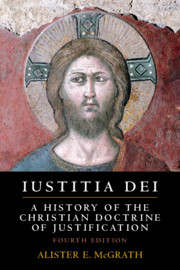Book contents
- Iustitia Dei
- Iustitia Dei
- Copyright page
- Contents
- Tables
- Preface to the Fourth Edition
- Abbreviations
- Introduction
- Part I Justification
- Part II The Middle Ages
- Part III Protestantism
- Part IV Catholicism
- Part V The Modern Period
- 27 The Enlightenment
- 28 The Long Nineteenth Century
- 29 Contemporary Renewal
- Conclusion
- A Brief Glossary of Medieval Soteriological Terms
- Works Consulted
- Index
27 - The Enlightenment
Justification, Moralism and Rationalism
from Part V - The Modern Period
Published online by Cambridge University Press: 27 January 2020
- Iustitia Dei
- Iustitia Dei
- Copyright page
- Contents
- Tables
- Preface to the Fourth Edition
- Abbreviations
- Introduction
- Part I Justification
- Part II The Middle Ages
- Part III Protestantism
- Part IV Catholicism
- Part V The Modern Period
- 27 The Enlightenment
- 28 The Long Nineteenth Century
- 29 Contemporary Renewal
- Conclusion
- A Brief Glossary of Medieval Soteriological Terms
- Works Consulted
- Index
Summary
The fifth section of this volume deals with the discussion of justification in the modern period, and deals mainly with Protestant approaches to the issue. Chapter 27 opens this discussion by considering the emergence of new attitudes to justification in England, in response to growing interest in the cultural virtue of ‘reasonableness’, the concept of ‘natural religion’ and the wider issue of religious toleration. Although there is now growing support for the notion that ‘Deism’ is partly socially constructed for polemical purposes, it remains a useful tool for discussing more rationalist approaches to the Christian faith which emerged in the eighteenth century. This chapter thus considers the Deist critique of the foundations of justification, such as the notion of original sin, focussing on writers such as John Toland and Matthew Tindal. The chapter then turns to consider the debates about justification which took place during the German Enlightenment, particularly the approaches associated with Johann Gottlieb Töllner and Gotthilf Samuel Steinbart. Finally, the chapter considers the philosopher Immanuel Kant’s views on radical evil and justification, which some scholars consider to mark a re-appreciation of the continuing significance of justification in secular moral discourse.
Keywords
- Type
- Chapter
- Information
- Iustitia DeiA History of the Christian Doctrine of Justification, pp. 343 - 355Publisher: Cambridge University PressPrint publication year: 2020

